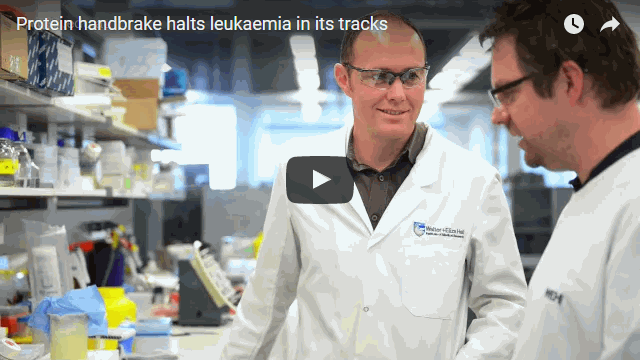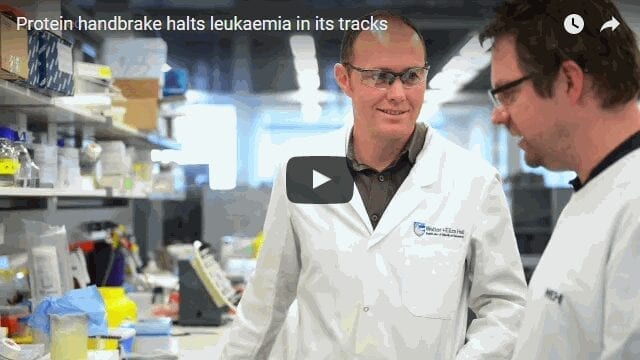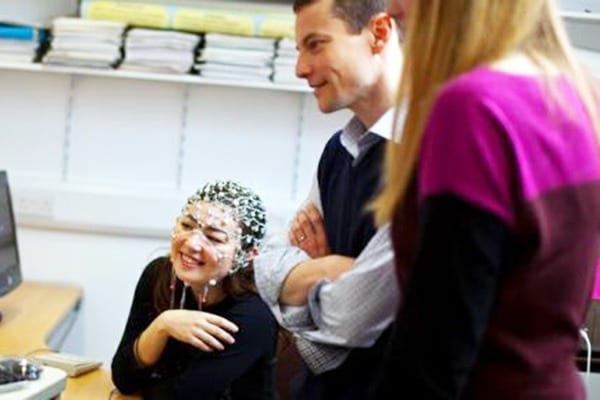
Melbourne researchers have shown they can stop leukaemia in its tracks by targeting a protein that puts the handbrake on cancer cell growth.
The researchers discovered that targeting a protein called Hhex could cure acute myeloid leukaemia (AML) in preclinical disease models, and could be a key target for new therapies for human leukaemia.
Dr Ben Shields and Dr Matt McCormack from the Walter and Eliza Hall Institute’s Cancer and Haematology division discovered that loss of the Hhex protein put the handbrake on leukaemia cell growth and division. The protein is a critical factor enabling AML cells to grow uncontrollably, a hallmark of cancer.
AML is an aggressive blood cancer that appears suddenly, grows quickly and has a poor prognosis. Existing treatments for AML are associated with serious side-effects. About three quarters of patients relapse after only a short period of treatment, with a five-year survival rate of just 24 per cent.
Dr McCormack said discovering how AML overcame normal cellular controls on growth and division was a breakthrough in the search for new therapies.
“There is an urgent need for new therapies to treat AML,” said Dr McCormack. “We showed blocking the Hhex protein could put the brakes on leukaemia growth and completely eliminate AML in preclinical models. This could be targeted by new drugs to treat AML in humans.”
He said Hhex was a particularly attractive therapeutic target because it was overproduced in leukaemia and, while essential for leukaemia cell growth, was not needed by healthy blood cells.
“Most existing treatments for AML are not cancer cell-specific, and unfortunately kill off healthy cells in the process,” Dr McCormack said.
“Hhex is only essential for the leukaemic cells, meaning we could target and treat leukaemia without toxic effects on normal cells, avoiding many of the serious side-effects that come with standard cancer treatments. We also know that most people with AML have increased levels of Hhex, often associated with adverse outcomes, further indicating it is an important target for new AML drugs.”
Dr Shields said AML cells switched off the controls that strictly manage cell growth and division. “Every cell has control genes that are activated when a cell is stressed, such as in the early stages of cancer, and stop the damaged cell from reproducing.” Dr Shields said.
While these control genes are still present in AML cells, they are switched off through a process called epigenetic modification. “Hhex works by recruiting epigenetic factors to growth control genes, effectively silencing them. This allows the leukaemia cells to reproduce and accumulate more damage, contributing to the speed of AML progression,” Dr Shields said.
Dr McCormack said drugs that inhibit epigenetic modification had been previously used to treat AML, but caused significant toxicity because their targets were also required for normal blood cell function.
“Unlike the epigenetic factors targeted previously, Hhex only regulates a small number of genes and is dispensable for normal blood cells. This gives us a rare opportunity to kill AML cells without causing many side effects,” said Dr McCormack. “We now hope to identify the critical regions of the Hhex protein that enable it to function, which will allow us to design much-needed new drugs to treat AML.”
Read more: Protein handbrake halts leukaemia in its tracks
The Latest on: Leukaemia
[google_news title=”” keyword=”leukaemia” num_posts=”10″ blurb_length=”0″ show_thumb=”left”]
via Google News
The Latest on: Leukaemia
- Mandeep meets Mandeep: How a techie's act of kindness saved an acute leukaemia patienton April 27, 2024 at 7:06 pm
Chronic myeloid leukaemia is a type of blood cancer that can lead to the formation of immature or abnormal blood forming cells called cancer cells, which enter the bloodstream and multiply in an ...
- Cure Leukaemia launches Walk For Nurses fundraising campaignon April 26, 2024 at 9:30 am
Willing participants are being encouraged to stage fundraising walks up and down the country on International Nurses Day on Sunday, May 12.
- More than £7,5000 raised for 25-year-old for Bognor Regis soldier with leukaemiaon April 26, 2024 at 4:46 am
Friends, family and fellow soldiers have raised more than £7,500 for a 25-year-old with leukaemia.
- Iraqi father seeks compensation from BP for son’s leukaemia death in legal firston April 23, 2024 at 4:26 am
An Iraqi father is seeking compensation from BP for the death of his 21-year-old son in what is thought to be the first case brought against a major oil firm for “flaring”.
- Iraqi father launches legal action against BP over son's death from leukaemiaon April 23, 2024 at 2:42 am
Iraqi father launches legal action against BP over son's death from leukaemia - Hussein Julood alleges his son Ali died after being exposed to pollutants from an oil field near their home in Iraq ...
- Emmerdale couple devastated as baby diagnosed with Leukaemia in heartbreaking spoilerson April 22, 2024 at 4:59 pm
Billy returns home choked up as he explains it could be an infection, autoimmune disease or even something like Leukaemia. Dawn's dad Will and wife Kim rush to the hospital but are halted when they ...
- Brave girl beats rare type of leukaemia – thanks to bone marrow from little sisteron April 21, 2024 at 3:18 pm
A GIRL with a rare blood cancer was saved – thanks to bone marrow from her little sister. Ruby Leaning was six when she collapsed on the school playground and was diagnosed with acute ...
- BBC Proms conductor Sir Andrew Davis dies aged 80 after battle with leukaemiaon April 21, 2024 at 10:17 am
Sir Andrew Davis, one of the longest-serving chief conductors of the BBC Symphony Orchestra, has died at the age of 80 after battling leukaemia, his agent has confirmed.
- BBC Proms conductor Sir Andrew Davis dies from leukaemia at the age of 80on April 21, 2024 at 8:13 am
Sir Andrew Davis, who was one of the longest-serving chief conductors of the BBC Symphony Orchestra, has died at the age of 80 after a battle with leukaemia, his agent has confirmed ...
- Dad to run marathon after leukaemia diagnosison April 20, 2024 at 5:11 am
A father who went through chemotherapy for leukaemia which left him with "no strength" to walk is running the London Marathon. Stephen Hughes, from Penrhyn Bay, Conwy, was diagnosed with acute ...
via Bing News











